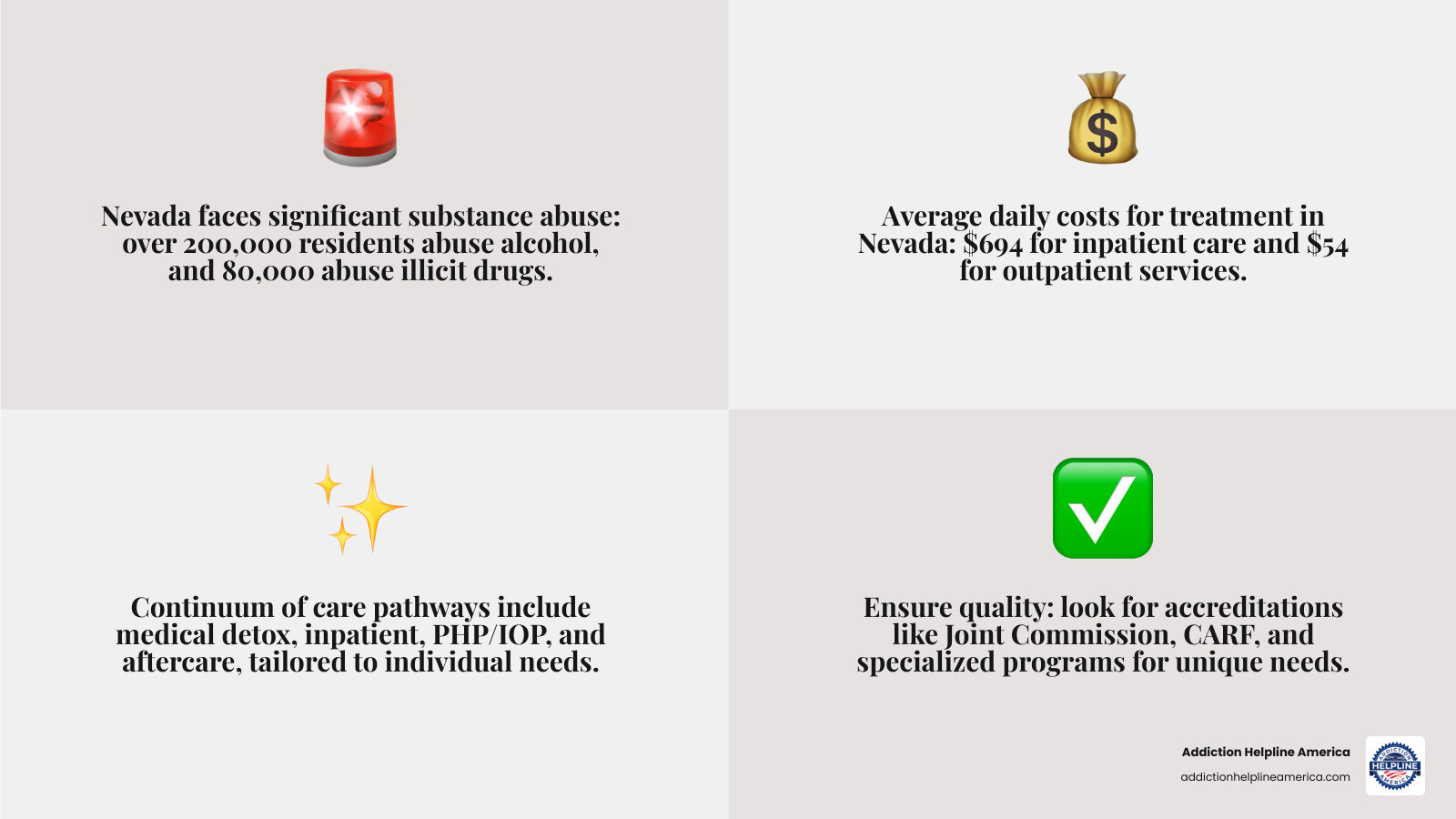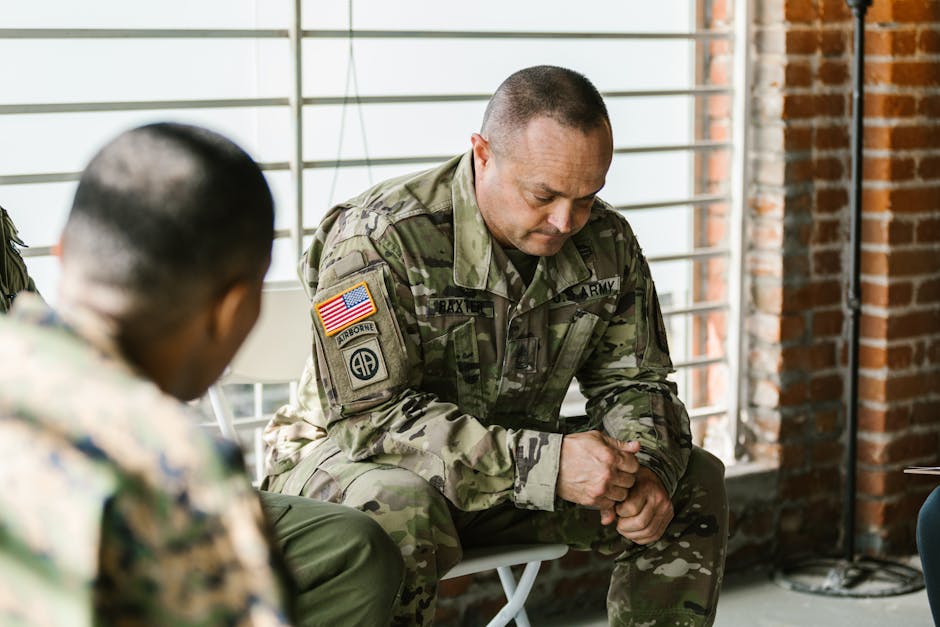
Your Guide to Finding Healing in the Heart of Nevada
Drug rehab centers in las vegas nevada offer a full spectrum of addiction treatment services, from medical detox to outpatient programs, with options for every budget and insurance plan.
Quick Guide to Las Vegas Drug Rehab Centers:
- Treatment Levels: Medical detox, inpatient/residential, partial hospitalization (PHP), intensive outpatient (IOP), and aftercare
- Average Costs: $694/day for inpatient care, $54/day for outpatient services
- Insurance Accepted: Most centers accept Aetna, Cigna, Blue Cross Blue Shield, Humana, and other major carriers
- Specialized Programs: Dual diagnosis, veteran-specific care, LGBTQ+ affirming treatment, gender-specific tracks
- Free/Low-Cost Options: State-funded programs and non-profit organizations
- Key Accreditations: Joint Commission, CARF International, LegitScript certification, Nevada DPBH licensing
Finding the right treatment center can feel overwhelming, but Las Vegas offers dozens of quality rehab facilities with different approaches and specialties. Whether you need immediate medical detox, long-term residential care, or flexible outpatient support, Nevada’s treatment landscape has options. The challenge isn’t finding a center—it’s finding the right center for you or your loved one.
At Addiction Helpline America, we help individuals and families steer drug rehab centers in las vegas nevada by connecting them with appropriate treatment programs. Our team understands the local treatment landscape and can help you make an informed decision quickly.
This guide breaks down seven essential factors to consider when choosing a Las Vegas rehab center, from understanding treatment levels to verifying insurance coverage.
Drug rehab centers in las vegas nevada terms explained:
- how much are drug rehab centers
- what drug rehab centers accept medicaid
- intensive outpatient treatment
Key #1: Understanding the Different Levels of Care
Addiction treatment exists on a continuum of care, meaning the intensity of your treatment can shift as your needs change. The American Society of Addiction Medicine (ASAM) provides guidelines to help professionals determine the right level of care for each person. This personalized approach is crucial, as someone needing medical attention for severe withdrawal has different needs than someone who is stable but requires ongoing support.
Medical Detox: The Foundation for Recovery
For many, recovery begins with medical detoxification. This is a medically supervised process to manage the uncomfortable and sometimes dangerous physical symptoms of withdrawal. Because withdrawal symptoms can range from mild to life-threatening, 24/7 medical supervision is essential for safety.
During detox at drug rehab centers in las vegas nevada, a medical team monitors your vital signs and may provide medication-assisted treatment (MAT) to ease symptoms and reduce cravings. Medications like buprenorphine for opioid withdrawal or benzodiazepines for alcohol withdrawal can be lifesaving. This phase typically lasts a few days to a week. Once you are physically stable, you can better engage in the therapeutic work of recovery.
Inpatient vs. Outpatient Programs
After detox, you’ll move into either residential treatment or an outpatient program. The right choice depends on addiction severity, co-occurring mental health conditions, and your home environment.
Residential (inpatient) treatment involves living at the facility full-time, usually for 30, 60, or 90 days. This structured environment with 24-hour care removes you from triggers and stressors. Days are filled with individual and group therapy, workshops, and activities to build coping skills. It’s ideal for those with severe addictions or an unsupportive home environment.
Outpatient programs allow you to live at home while attending treatment. They offer flexible schedules that support community integration, letting you maintain work or family responsibilities.
- Partial Hospitalization Programs (PHP): The most intensive outpatient option, with programming for most of the day, five to seven days a week.
- Intensive Outpatient Programs (IOP): A step down in intensity, with treatment sessions three to five days per week for several hours each day. This is great for transitioning from residential care or for those with moderate addiction and a stable home. Our intensive outpatient treatment guide offers more details.
- Standard outpatient programs: The least intensive, involving weekly therapy and support groups for those with a solid recovery foundation.
Outpatient options at drug rehab centers in las vegas nevada allow you to practice new coping skills in real-world situations with professional support.
Aftercare and Sober Living
Graduating from rehab is the starting line for your recovery journey, not the finish line. Aftercare is the ongoing support that helps you maintain sobriety after your initial program.
This can include continued counseling, alumni programs, and peer support networks like Alcoholics Anonymous or Narcotics Anonymous. These resources provide accountability, guidance, and connection.
Many people benefit from sober living homes (halfway houses) during this transition. These are safe, substance-free living environments where you live with others committed to recovery. Sober living provides a supportive place to practice what you learned in treatment while building independence.
This transitional support is crucial for relapse prevention. Research shows that people who engage in aftercare have significantly better long-term outcomes. Aftercare helps protect the investment you’ve made in your health and future.
Key #2: Finding Specialized Programs for Unique Needs
Addiction doesn’t look the same for everyone. The best drug rehab centers in las vegas nevada offer individualized care plans and targeted therapy for specific populations. Look for facilities with peer groups where you can connect with people who share your experiences and a trauma-informed approach to care.
Dual Diagnosis: Treating Co-Occurring Disorders
It’s common for addiction to co-exist with mental health challenges like anxiety, depression, PTSD, or bipolar disorder. This is called dual diagnosis, and it requires specialized care that addresses both conditions simultaneously.
Quality drug rehab centers in las vegas nevada with dual diagnosis programs offer integrated treatment. Your care team treats both the substance use and mental health disorder as part of one holistic plan. This approach combines psychotherapy, medication management, and specialized group sessions, focusing on holistic healing for the whole person.
Programs for Veterans and First Responders
Veterans and first responders face unique stressors from combat trauma and constant crisis exposure, which can lead to substance use as a coping mechanism. Specialized tracks like a Salute to Recovery or Valor Program are designed for military members and first responders.
These programs are staffed by clinicians who understand military culture and the invisible wounds of service, some having completed PsychArmor training. You’ll find confidential support and connect with peers who have walked a similar path, creating a space of shared understanding and healing.
Other Specialized Tracks in Las Vegas
The diversity of drug rehab centers in las vegas nevada means there are programs for many specific needs.
- LGBTQ+ affirming care provides a safe, non-judgmental environment where therapists understand the unique challenges faced by the community.
- Gender-specific programs for men or women create safe spaces to explore sensitive issues. Women’s programs may focus on trauma and motherhood, while men’s programs might address emotional expression and societal pressures.
- Chronic pain programs help individuals who developed an addiction after being prescribed pain medication, teaching healthy alternatives for managing discomfort.
- Executive rehab offers privacy and amenities for professionals and business leaders, sometimes allowing for limited work communication so you can heal without completely disconnecting from responsibilities.
Addiction Helpline America can help you find a specialized program that fits not just your addiction, but your whole life story.
Key #3: Navigating Costs and Insurance for Drug Rehab Centers in Las Vegas Nevada
The financial aspect of recovery can feel overwhelming, but treatment is an investment in your life, health, and future. Fortunately, more payment options and financial support systems are available for drug rehab centers in las vegas nevada than most people realize.
The Average Cost of Treatment in Nevada
Costs in Nevada vary by care type, duration, and amenities. For inpatient or residential treatment, the average is around $694 per day. This all-inclusive rate covers lodging, meals, medical supervision, and all therapies. Outpatient services are more affordable, averaging around $54 per day for programs like PHP and IOP.
Many centers offer self-pay options, financing plans, and sliding scale fees based on income to make treatment more accessible. If you want to learn more about costs, our guide on how much are drug rehab centers provides a detailed breakdown.
How to Verify Your Insurance Coverage
Thanks to mental health parity laws, most private insurance plans from carriers like Aetna, Cigna, Blue Cross Blue Shield, and Humana cover substance abuse treatment. However, understanding deductibles, co-insurance, and in-network providers can be confusing.
At Addiction Helpline America, we simplify insurance verification. You can call our helpline, and our admissions coordinators will contact your provider to determine what your plan covers and what your out-of-pocket costs will be. We provide clear, straightforward information to help you make an informed decision without letting insurance confusion delay getting help.
Low-Cost and Free Resources in Las Vegas
If you don’t have insurance or have limited coverage, help is still available. Las Vegas and Nevada have safety nets to ensure everyone can access treatment, regardless of their financial situation.
State-funded programs, supported by federal and state grants, offer addiction treatment services to eligible Nevada residents at a reduced cost or for free. Eligibility is typically based on income and residency.
Many community support networks and non-profit organizations also provide free or low-cost recovery programs. These groups are dedicated to helping people rebuild their lives and often operate on a sliding scale or through grants to serve those in need.
Additionally, many drug rehab centers in las vegas nevada accept Medicaid, which expands access to quality care. Our guide on what drug rehab centers accept medicaid offers more information on using this coverage.
The bottom line is that financial barriers can be overcome. Whether you have private insurance, Medicaid, or no coverage, there are pathways to treatment. Addiction Helpline America can help you find them.
Key #4: Verifying Quality Through Accreditations and Certifications
When searching for drug rehab centers in las vegas nevada, you’re making a critical decision about your health and safety. Accreditations and certifications are stamps of approval from independent organizations, indicating that a facility meets rigorous standards for quality care.
Anyone can create a nice website, but earning accreditation requires proof of excellence. A reputable center will proudly display its credentials, and you should look for them before making a choice.
The Gold Standard: Joint Commission and CARF
Two of the most respected names in healthcare accreditation are The Joint Commission and CARF International. They set the bar for quality addiction treatment.
- The Joint Commission conducts thorough, unannounced evaluations of facilities, examining everything from patient care to safety procedures. Their accreditation is a nationally recognized symbol of quality.
- CARF International (Commission on Accreditation of Rehabilitation Facilities) focuses specifically on rehabilitation and behavioral health. CARF accreditation means a facility uses person-centered, evidence-based practices to achieve positive outcomes.
Both organizations require regular re-evaluation, ensuring that centers consistently maintain high standards.
Other Important Credentials for Reputable Centers
Several other credentials provide additional assurance of a facility’s quality.
- LegitScript certification has become essential for online transparency. It verifies that treatment centers operate legally and represent their services accurately, protecting you from misleading claims.
- State licensing from Nevada’s Division of Public and Behavioral Health (DPBH) is the minimum requirement for any facility to operate legally. Always confirm a center holds a current state license.
- A good Better Business Bureau (BBB) rating indicates fair business practices and a commitment to resolving customer issues.
- Membership in the National Association of Addiction Treatment Providers (NAATP) shows a center’s commitment to a strict code of ethics and professional standards.
Don’t hesitate to ask facilities about their accreditations. These credentials are your assurance that you’re choosing a safe, professional environment for healing.
Key #5: Exploring Therapies, Amenities, and Daily Life
Understanding the day-to-day experience at a treatment center can ease anxiety about rehab. The best drug rehab centers in las vegas nevada create environments where clinical excellence meets comfort, with structured days that promote healing.
Evidence-Based and Holistic Therapies
Effective treatment blends scientifically-proven therapies with holistic approaches that address the whole person.
Evidence-based therapies form the clinical foundation. These include:
- Cognitive Behavioral Therapy (CBT): Helps you recognize and change negative thought patterns that lead to substance use.
- Dialectical Behavior Therapy (DBT): Focuses on emotional regulation and tolerating discomfort without turning to substances.
- EMDR (Eye Movement Desensitization and Reprocessing): A powerful therapy for processing unresolved trauma, which is often a driver of addiction.
You’ll also participate in individual counseling for personalized goal-setting and group therapy to share experiences with peers, which reduces feelings of isolation.
Holistic therapies engage different parts of your being. Art therapy allows for non-verbal expression, while equine therapy teaches trust and self-awareness through work with horses. Yoga and meditation are practical tools for managing anxiety and cravings. Many centers also incorporate fitness and nutrition programs to help heal the physical damage caused by addiction.
What Is a Typical Day in a Las Vegas Rehab Like?
Structure is a key component of early recovery. While each facility varies, a typical day in residential treatment provides a predictable and comforting rhythm.
- Morning: The day often starts with meditation or mindfulness, followed by a communal breakfast. The first group therapy session of the day usually focuses on topics like coping skills or trigger identification.
- Midday: After lunch, you may have your individual therapy session. Afternoons often include specialized therapies like CBT or DBT, educational workshops, or holistic activities like art or equine therapy.
- Afternoon: Time is set aside for recreational activities like sports, walking, or quiet time for reading and journaling. Physical activity and rest are both crucial for regulating mood.
- Evening: After dinner, you might attend a 12-Step meeting (like AA or NA), either on-site or in the community. This helps you build a support network for after treatment. The evening may also include process groups or educational films.
- Night: Before lights out, you’ll have free time to call loved ones or journal. Rest is essential for the healing work your body and brain are doing.
This structure removes the chaos of active addiction and allows you to focus completely on healing.
Amenities That Support a Healing Journey
The physical environment plays a significant role in recovery. Quality drug rehab centers in las vegas nevada provide comfortable and safe spaces to support your journey.
Accommodations range from private rooms for solitude to shared rooms that foster peer support and reduce isolation. Nutritious, chef-prepared meals help your body heal and create a sense of community. Fitness centers and swimming pools offer healthy outlets for stress and anxiety, releasing natural endorphins.
The desert landscapes surrounding Las Vegas also offer unique healing opportunities. Many centers have outdoor patios, walking paths, and gardens, providing a sense of peace and perspective. These amenities aren’t luxuries; they are therapeutic tools that create an environment where you can focus entirely on the inner work of recovery.
Frequently Asked Questions about Las Vegas Rehab
Considering treatment brings up many questions. Here are clear, honest answers to some of the most common ones we hear about drug rehab centers in las vegas nevada.
How do I start the admissions process for drug rehab centers in las vegas nevada?
The process begins with a confidential phone call to an admissions coordinator. When you call Addiction Helpline America, we’ll conduct a pre-intake screening to understand your situation, substance use history, and any mental health concerns. This conversation helps us determine the best level of care for you.
We will also verify your insurance benefits with carriers like Aetna, Cigna, Blue Cross Blue Shield, and Humana to give you a clear picture of your coverage and any out-of-pocket costs. Our goal is to remove barriers and make the process as smooth as possible.
Will I lose my job if I go to rehab?
This is a common fear, but you have legal protections. The Americans with Disabilities Act (ADA) recognizes substance use disorder as a disability, making it illegal for employers to discriminate against you for seeking treatment. Additionally, the Family and Medical Leave Act (FMLA) allows eligible employees to take up to 12 weeks of unpaid, job-protected leave for medical reasons, including substance abuse treatment.
Our team can help you understand your rights and guide you on how to communicate with your employer. You don’t have to choose between your health and your job.
What is aftercare and why is it important?
Completing a rehab program is a major achievement, but recovery is a lifelong journey. Aftercare is the ongoing support you receive after your primary program ends, acting as a bridge to long-term sobriety.
Effective aftercare for graduates of drug rehab centers in las vegas nevada often includes sober living homes, alumni groups, ongoing outpatient counseling, and participation in support group meetings like Alcoholics Anonymous (AA) or Narcotics Anonymous (NA). These resources provide accountability, community, and guidance as you steer real-world challenges. Studies show that individuals who engage in aftercare have significantly lower relapse rates and better long-term outcomes.
Your New Beginning Starts Today
If you’ve read this far, you’ve already taken a huge step. Finding the right drug rehab centers in las vegas nevada is within your reach. You now have the tools to understand care levels, specialized programs, costs, and quality indicators.
The right treatment center is out there—one that understands your situation and can provide the personalized support you need to heal. Recovery is possible, and we believe it can happen for you.
At Addiction Helpline America, we are your partners in this journey. Our team offers free, confidential guidance, connecting you to our network of trusted treatment centers. We’re here to answer your questions, verify insurance, and help you find the perfect fit.
You don’t have to do this alone. Your new beginning can start right now.
Take the first step toward recovery by reaching out to us today. Whether it’s 3 PM or 3 AM, someone is ready to help. Everyone deserves a chance at healing, and that includes you.
Our helpline is 100%
free & confidential
If you or someone you care about is struggling with drug or alcohol addiction, we can help you explore your recovery options. Don’t face this challenge alone—seek support from us.
Programs
Resources
Will my insurance
cover addiction
treatment?
We're ready to help
Find the best
drug or alcohol treatment
center
Are you or a loved one struggling with addiction? Call today to speak to a treatment expert.

















